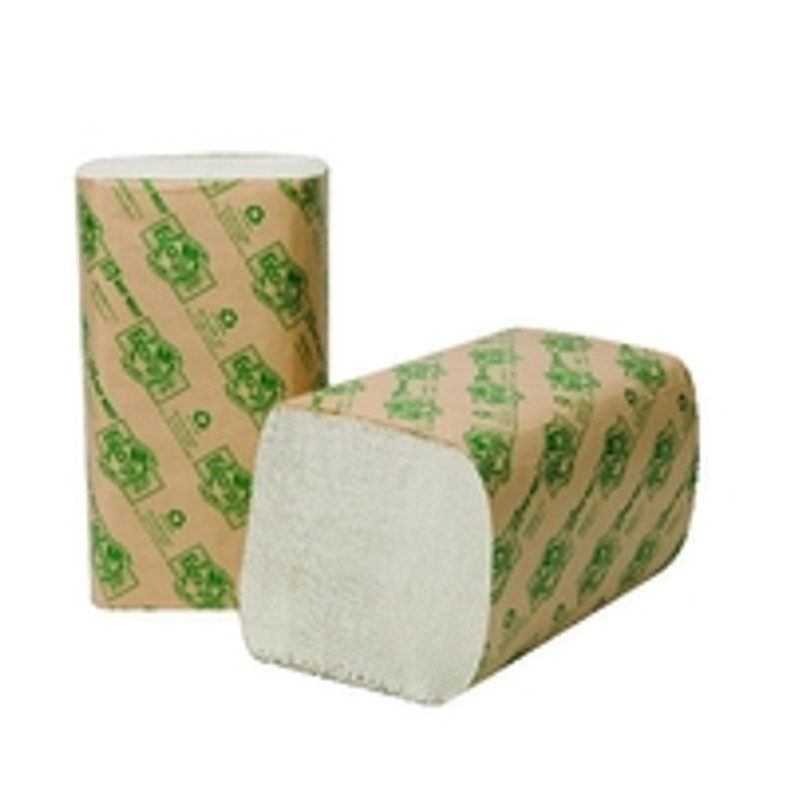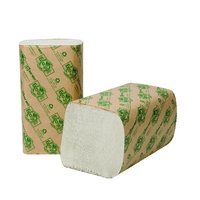Rule of Thumb
Lead with private label paper towels versus more expensive national brands.
When choosing paper towels, remember…
-
Check how many individual units/rolls are in the case and calculate the cost per unit/roll
- Fewer units/rolls in a case can give the appearance of a better value if only the price is considered
- Calculating and comparing the cost per unit/roll will give you a more accurate read on the value being offered
-
Compare the number of sheets and size of the sheets to compare the cost (perforated rolls and folded towels)
- Verify the size of the sheets. A smaller sheet equals a lower cost.
- Short or narrow sheets drive down the cost because there is less paper (and raw material)
-
Compare the type of paper
- Embossed or quilted? Quilting/embossing adds higher absorbency, softer feel and additional cost versus “flat” sheets. They are more expensive because of the additional expense associated with enhanced raw materials and processes to finish the paper.
- Whiter, brighter sheets? Making whiter, brighter sheets is a process that needs more virgin pulp to produce a whiter product.
-
When in doubt, weigh the individual roll or case. That will help determine the quality of the product
- Some manufacturers will “cheat’ on paper basis weight to drive down the price with a lower quality product. They “cheat” by offering a product with thinner weight or thickness paper in its raw material state.
Paper Color
- White or Bleached – typically costs more and contains less post-consumer recycled fiber; white paper may vary significantly in quality
- Brown / Kraft / Tan / Natural – typically cheaper and contains more post-consumer recycled fiber;kraft paper quality does not vary significantly from manufacturer to manufacturer
Why is that product cheaper?
- Less paper – with folded towels, this may mean a smaller towel or fewer towels per sleeve than advertised; with roll towels, this likely means a shorter roll (i.e. 700’ instead of 800’); with both, it may mean a smaller case pack
- End-user contracts – for branded items, manufacturers may offer contracts at a significant discount for high volume end-users
Roll Paper Towels
Hardwound Roll Towel
- Most common roll towel for away-from-home use
- Often less expensive than folded towels, depending on dispenser.
- Roll length varies: 350’, 425’, 600’, 800’, 1000’
Centerpull Towel
- 1 ply or 2 ply (2-ply most common)
- Roll sizes/type varies
- 1-ply typically has 990’ on roll
- 2-ply typically has 660’ on roll
Kitchen Roll Towel
- Also call household roll towels
- Individually wrapped in plastic
- Industry standard: 100 or 85 sheets
Branded Proprietary Roll Paper Towels
- Look like and are similar to hardwound roll towels or centerpull towels
- Notched or sized such that they only fit a proprietary dispenser
- Various versions are produced by most branded manufacturers
- Available to only select distributors or end-users
- Examples: Georgia Pacific’s enMotion, Cormatic, Sofpull, Towlmastr/Towlsaver
Folded Paper Towels
Multifold Towel
- Most common folded towel in most areas of the country
- Interfolded in a zigzag shape
- Often used in higher traffic areas, such as schools, hospitals, factories
- Fits most universal dispensers
- Can’t be loaded upside down
- Less likely to multiple dispense, but waste from tearing and falling out
C-Fold Towel
- Folded in a “C” shape and stacked
- Often used in lower traffic areas, and in nicer environments, such as restaurants
- Fits most universal dispensers
- Can be loaded upside down and then hard to get out of dispenser
- Waste from multiple dispense is common
Singlefold Towel
- Least common folded towel
- Folded once
- Low-cost
- Fit single-fold dispensers only
- Tabbing and tearing is common – small tab in your hand and the towel is still in the dispenser
Branded Proprietary Folded Towels
- Look like and are similar to multifold or C-fold towels
- Notched or sized such that they only fit a proprietary dispenser
- Various versions are produced by most branded manufacturers
- Available to only select distributors or end-users
- Examples: Georgia Pacific’s BigFold Z, Kimberly-Clark’s SCOTTFold


